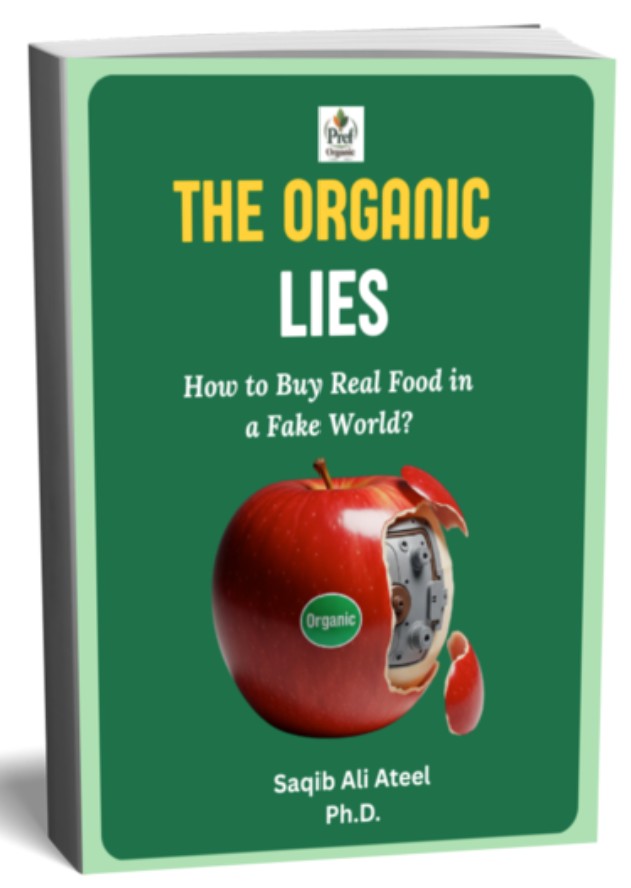Environmental Benefits of Organic Farming, Hard Facts and A Few Solutions

By: Dr. Salman Ahmad, Ph.D. Agronomy
Salmanahmedbwp@yahoo.com
Minimizing pollution, protecting biodiversity, ecosystems, and soil conservation are a few environmental benefits of organic farming. When you go deep, a revolution requires to achieve any of these goals.
Conventional agriculture is the primary crop pattern in deteriorating natural habitats, mainly due to the non-judicious use of fertilizers and pesticides. The agriculture sector contributes about 25% of anthropogenic greenhouse gases emissions worldwide.

Different studies from the USA, Germany and Switzerland highlight various environmental benefits of organic farming. Organic farming stores average 590 kg of carbon per hectare than the conventional farming system. Organically managed soils also emit less nitrous oxide (N2O) than conventionally managed soils. Nitrous oxide is 300 times more harmful than carbon dioxide.
Agriculture induced water pollution is associated with the leaching of nutrients (mainly Nitrogen) in underground water, and water reaches from agricultural farms to the lakes and rivers containing chemicals (eutrophication). Millions of hectares of productive soil have become barren due to soil erosion and degradation. Management practices involved in organic farming like organic matter, green manuring, mulching, use of cover crop etc., help to minimize the problem of water pollution, soil erosion and decline in productivity. Different meta-analysis and results of long term field experiments also confirmed that organically managed soils are rich in organic matter, having more earthworm population, more bio-diversified, fertile and stable than soils under the conventional farming system. Soils rich in organic matter store more water, increase water infiltration into the ground, reduce leaching, runoff losses and provides water to the plants during dry periods. That's why the organic system is considered more stable under stressful conditions, especially in a drought.
While analyzing the environmental benefits of organic farming we can’t ignore certain cons which can’t be ignored.
Some Hard Facts Behind Organic Farming
Can organic farming feed the world?
It is a frustrating question. We are more than 7 billion and expected to become around 9 billion in 2050. To meet the increasing population's hunger needs, global food production needs to increase by 60% or more. According to the WHO, about 820 million world population is suffering from food shortage at the moment. Further, organically grown crops' yield is 20 to 25% less than crops grown under conventional agriculture system. To fill the 35% food shortage gap means increasing the cultivable land to the extent of 50%. Simultaneously, the world's arable land decreases day by day due to increasing population, urbanization, and industrialization. How would organic farming fulfil the world's dietary needs at present and in the coming future?
Of organic agriculture, the primary source of nutrients is animal farm-based organic products and leguminous crops. Currently, 11% of crop nitrogen requirements are fulfilled using farm-based organic matter and 8% from leguminous crops and crop residues. So, the transformation from conventional to organic agriculture means significantly increasing the number of farm animals and area under leguminous crops, which further reduce the area for staple food crops.
In case of a sudden outbreak of some pest/diseases (recently examples are locust and fall armyworm attack), organic farming is more threatened to huge losses than conventional agriculture and may cause the menace of food insecurity because in organic farming use of chemicals is restricted/ minimized. Further, organic farming also increases the demand for farm labor and female farm workers' workload in agricultural countries, primarily female workers.
Besides the lower yield of organic products, farmers feel attracted to organic farming due to higher market price and demand. But this situation does not exist everywhere. In most developing countries, farmers have not accessed major markets and mainly sell their products in the local market. Secondly, if the supply of organic products increases in the market, as a general rule, "when supply increases, demand decreases," which may decrease the organic grower's income.
Are organic products available in markets organic? As the shelf life of organic products is short, these products are processed to increase shelf life. But this processing of organic raw products deteriorates their quality. Moreover, organic standards also vary from country to country. Different private organic firms have their specific organic food standards, making commercially available organic products controversial.
How to get the best from environmental benefits of organic farming?
Transfer from conventional to organic farming is a longtime process. It requires government preference, attention and efforts, and the change in people's eating habits and food preference. According to FAO, about one-third of the produced food is wasted by the end consumer. So, we have to minimize this food loss to favour and promote organic farming. Following are some suggestions for promoting organic agriculture:
• As organic farming works under nature principles, so rehabilitation of natural ecosystems through afforestation, soil and water conservation and techniques like integrated agriculture should be encouraged.
• The government's support and motivation about organic farming, research funding, loans, subsidies, and marketing facilities would be needed.
• Small scale chemical-free production programs like home gardening, kitchen gardening, top roof farming (mostly in commercial cities), and bio-pesticides should be promoted.
• Development of organic-based production technology of crops, its transformation and necessary training to the growers.
• Crops that naturally require less chemical input should be incorporated into the current farming system.
Essential/edible crops may preferably be shifted to organic farming than industrial/commercial crops.
- Home
- Organic Farming
- Environmental Benefits of Organic Farming
